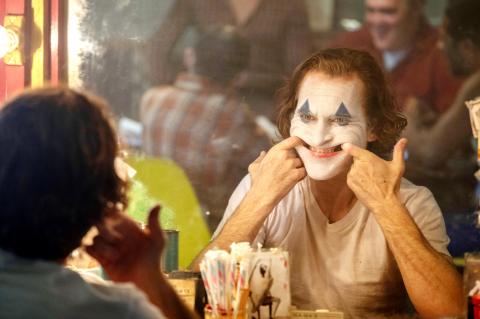There are no capes, no special powers and no battles between good and evil in the new Joker movie, whose portrayal of the most famous villain in comic book history is the most chilling twist on the character in 50 years.
The Joker has been depicted on television and in movies since 1966 and has undergone a series of ever darker transformations from his early days as a campy clown with a mirthless laugh.
“It’s barely the same character,” said Matthew Belloni, editorial director of the Hollywood Reporter. “I think the Joker has reflected the times in which he is portrayed.”

Photo: AP
Joker, starring Joaquin Phoenix and opening in movie theaters worldwide this week after winning the top prize at the Venice film festival last month, is the first film where the Joker is the lead character but there is no Batman.
Set in 1980s New York, the Warner Bros film is a standalone origin story that depicts the man who becomes Batman’s arch-nemesis as an isolated, bullied, delusional, mentally-ill loser who unwittingly inspires a populist rebellion manned by other outcasts adopting red noses and clown masks.
“The new Joker is a plunge into nihilism. There is no redemption at all. It is a lot grimmer to watch than even Heath Ledger’s Joker in The Dark Knight,” said David Crow, an associate editor at pop culture Web site Den of Geek.
Phoenix, 44, whose performance is seen by awards watchers as a likely contender for a best actor Oscar next year, told reporters in Venice in August, “I didn’t refer to any past creations of this character.”
LARGELY A PRANKSTER
Phoenix’s take on the Joker is far removed from Cesar Romero, who was the first actor to play the role in the 1960s Batman television series, which was mainly aimed at children.
“Romero didn’t even shave his mustache for the role. He put the make-up on top of the mustache. He had a lot of fun with it,” said Crow.
In 1989, Jack Nicholson brought his edgy, maniacal touch to the character in the Batman movie but was still largely a prankster.
Ledger reinvented him as unsettling and unhinged in The Dark Knight in 2008, when the Joker became a terrorist in a post-Sept. 11 era beset by fears of anarchy and chaos.
Yet Ledger, who won a posthumous supporting actor Oscar for the role, “still played it a bit like a rock star, there was a bit of grunge glamor,” said Crow.
“Batman gets to stop him in the end. He does blow up a hospital but he never took it to a truly irredeemable place,” added Crow.
Phoenix, by contrast, turns in a performance so nerve-wracking that it is difficult to watch at times, said Belloni.
“If this was not a comic book character it would be among the most chilling characters I have ever seen in film. It’s really disturbing,” Belloni said.
The film has an R rating in the US, meaning those under 17 need to be accompanied by a parent.
“It’s not for kids, and they won’t like it anyway,” the Alamo Drafthouse movie theater chain said in a warning on its Web site ahead of the opening weekend.

April 28 to May 4 During the Japanese colonial era, a city’s “first” high school typically served Japanese students, while Taiwanese attended the “second” high school. Only in Taichung was this reversed. That’s because when Taichung First High School opened its doors on May 1, 1915 to serve Taiwanese students who were previously barred from secondary education, it was the only high school in town. Former principal Hideo Azukisawa threatened to quit when the government in 1922 attempted to transfer the “first” designation to a new local high school for Japanese students, leading to this unusual situation. Prior to the Taichung First

Chinese Nationalist Party (KMT) Chairman Eric Chu (朱立倫) hatched a bold plan to charge forward and seize the initiative when he held a protest in front of the Taipei City Prosecutors’ Office. Though risky, because illegal, its success would help tackle at least six problems facing both himself and the KMT. What he did not see coming was Taipei Mayor Chiang Wan-an (將萬安) tripping him up out of the gate. In spite of Chu being the most consequential and successful KMT chairman since the early 2010s — arguably saving the party from financial ruin and restoring its electoral viability —

The Ministry of Education last month proposed a nationwide ban on mobile devices in schools, aiming to curb concerns over student phone addiction. Under the revised regulation, which will take effect in August, teachers and schools will be required to collect mobile devices — including phones, laptops and wearables devices — for safekeeping during school hours, unless they are being used for educational purposes. For Chang Fong-ching (張鳳琴), the ban will have a positive impact. “It’s a good move,” says the professor in the department of

Article 2 of the Additional Articles of the Constitution of the Republic of China (中華民國憲法增修條文) stipulates that upon a vote of no confidence in the premier, the president can dissolve the legislature within 10 days. If the legislature is dissolved, a new legislative election must be held within 60 days, and the legislators’ terms will then be reckoned from that election. Two weeks ago Taipei Mayor Chiang Wan-an (蔣萬安) of the Chinese Nationalist Party (KMT) proposed that the legislature hold a vote of no confidence in the premier and dare the president to dissolve the legislature. The legislature is currently controlled